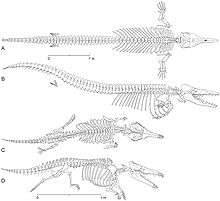Maiacetus
| Maiacetus Temporal range: Middle Eocene | |
|---|---|
 | |
| Maiacetus skeleton cast in the Smithsonian Museum | |
| Scientific classification | |
| Kingdom: | Animalia |
| Phylum: | Chordata |
| Clade: | Synapsida |
| Class: | Mammalia |
| Order: | Artiodactyla |
| Infraorder: | Cetacea |
| Family: | †Protocetidae |
| Subfamily: | †Protocetinae |
| Genus: | †Maiacetus Gingerich et al., 2009 |
| Species | |
| |
Maiacetus ("mother whale") is a genus of early middle Eocene (ca. 47.5 mya) cetacean from Pakistan.
Paleobiology



The genus contains a single species Maiacetus inuus, first described in 2009 on the basis of two specimens, including a specimen which has been interpreted as a pregnant female and its fetus.[1] This represents the first description of a fetal skeleton of an archaeocete. The position of the fetus (head-first) suggests that these whales gave birth on land.[2] Whales generally give birth tail first, while all land mammals give birth head first. That the Maiacetus should give birth on land is not so implausible because this whale is semiaquatic or amphibious. Maiacetus represents the transition of land mammals back to the oceans where these animals were living on the land-sea interface and going back and forth.[3]
However, J. G. M. Thewissen, discoverer of Ambulocetus, has questioned these conclusions, suggesting that the smaller skeleton could be a partially digested meal. Even if the small skeleton is a fetus, Thewissen writes that it may not have been preserved in its normal in-vivo position.[4] Authors pointed out in the original article, however, that the fetal skull has no tooth marks.[1]
This species is medium-sized with a skeleton 2.6 metres (8.5 ft) in length and an estimated weight of 280 to 390 kilograms (620 to 860 lb).
See also
References
- 1 2 Gingerich PD, Ul-Haq M, von Koenigswald W, Sanders WJ, Smith BH, Zalmout IS (2009). "New protocetid whale from the middle eocene of pakistan: birth on land, precocial development, and sexual dimorphism". PLoS ONE. 4 (2): e4366. doi:10.1371/journal.pone.0004366. PMC 2629576
 . PMID 19194487.
. PMID 19194487. - ↑ "Earliest whales gave birth on land", Science News, 3 February 2009
- ↑ "Ancient Whale Relative Gave Birth on Land", "Science Friday", 6 February 2009
- ↑ J. G. M. Thewissen and William A. McLellan (2009) Maiacetus: displaced fetus or last meal? PLoS ONE.